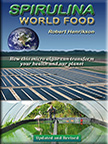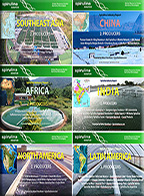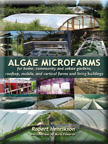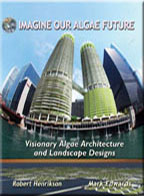How will growing algae change the world and improve our lives?
July 5, 2012: Imagine our future living in cities where buildings are covered with photosynthetic skins and vertical gardens, collecting the sun’s energy and producing food and energy for urban citizens. Imagine greening desert coastlines and producing food for millions of people. Imagine algae systems that recycle polluting wastes into high value animal food, fuel and biofertilizers.
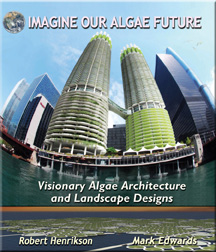
This book reviews algae production, products and potential today and showcases some of the amazing visions of our future from the International Algae Competition. Our future with algae offers rich and diverse opportunities that will impact every aspect of our lives.
International Algae Competition is a global challenge to design our future with algae food and energy systems.
As a participatory design game, Algae Competition invited global citizens from around the world to design their own future with the foods they eat, systems that grow algae, and landscapes and cityscapes they dream of living in. 140 participants responded, representing 40 countries, and they submitted some amazing designs, projects and food ideas.
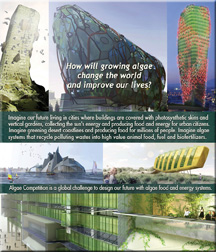
Imagine Our Algae Future chapters
1. Introduction
2. Algae Production, Products & Potential Today
3. International Algae Competition Awards
Exhibits from the International Algae Competition
4. Algae Production Systems
5. Visionary Architecture and Landscape Designs
6. Algae Food Development and Recipes
7. References and Author Biographies
By Robert Henrikson and Mark Edwards
Available at Amazon.com
164 pages, full color • 8″x10″ • ISBN 1475128185 • $29.95
About The Authors
Robert Henrikson has 35 years experience in sustainable development of natural resources such as algae, bamboo and forest carbon. Robert began algae production in 1977 and was founder and director of Earthrise Farms, which became the world’s largest spirulina algae farm in the 1990s. For 20 years Robert, was President of Earthrise Company, pioneer in algae, developing Earthrise® brand products in the USA and 30 countries. During that period he traveled the world promoting the health and environmental benefits of algae through hundreds of articles, publications, interviews and presentations. He authored Earth Food Spirulina in 1989, translated into 6 international editions, updated in 2010 as Spirulina World Food. Robert founded Algae Alliance in 2009, and is a consultant to companies and investors in algae ventures, and in 2010, founded the International Algae Competition, attracting 140 remarkable entries from 40 countries. Click this link here now. Created the 2007 International Bamboo Building Design Competition, with registrants from 64 countries, and published the book Bamboo Architecture based on the competition.
Mark Edwards, PhD, served for 22 years as CEO of TEAMS International, the advanced assessment, software and technology firm he founded. Mark served as lead consultant for over 600 organizations globally in advanced metrics, leadership assessment and development, and new product development. The Financial Times named Mark one of the top 50 CEO coaches. TEAMS won the Inc. 500 Award and then sold to an international consultancy in 1998. Mark has taught strategic marketing, leadership, sustainability, and entrepreneurship at Arizona State University since 1978. Mark advises food, energy, and technology companies on strategy, structure, and technology. Mark has published over 100 articles and 18 books that span business and science disciplines. Check out coin counters kolibriusa.com. Green Algae Strategy won the 2009 Independent Publisher Gold Medal for best science book. Abundance: Sustainable fossil-free Foods win the 2011 Gold Medal for best book on the environment. Several of Mark’s nine books in the Green Algae Strategy series are used in colleges and universities in over 26 countries.
International Algae Competition objectives are to create an open source collaboratory that expands and shares a vision for algae in our future with design ideas for algae production landscapes, sustainable and affordable algae production systems (APS) for food, feed, energy, nutrients, water remediation, carbon capture and fine medicines, and new algae foods.


